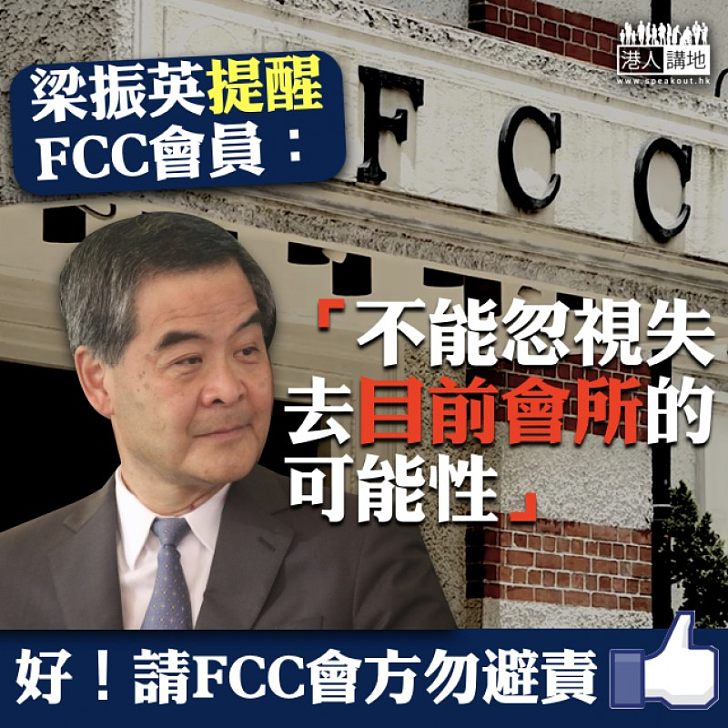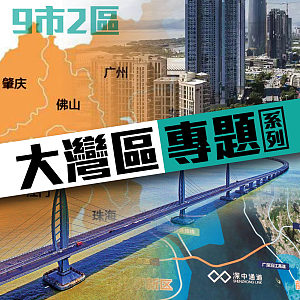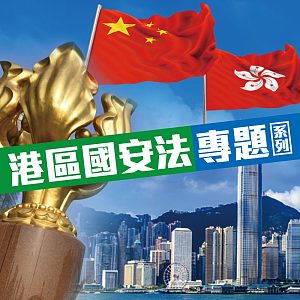【尚未交代】FCC公開為分離主義者搭建平台 梁振英建議FCC會員關注會所前途問題

主動邀請分離主義者到其會址分享「港獨」見解及主張的香港外國記者會(FCC),至今仍未有向香港人道歉,以及將來會否繼續邀請其他分離主義者煽動分裂國家的主張。全國政協副主席梁振英今日在個人社交網站向FCC會員發公開信,指FCC為「港獨」份子、香港民族黨召集人陳浩天在其會所舉辦午餐演講會,令大家不得不注意這個會所的歷史和未來。他認為,FCC會員應該關注,一旦該會喪失特權,不能在沒有競爭的情況下繼續租用該會址,在有可能失去會所的情況下,會員的入會費和月費會否退還和減免。 梁振英指出,FCC認為邀請陳浩天演講是行使言論和新聞自由,既然如此,相信該會日後一定會以同樣理由,繼續邀請其他分裂國家人士,包括主張「台獨」和「藏獨」的份子到該會演講:「如果我這個推論不對,請外國記者會公開說明。」他認為,此類活動明顯違反《基本法》,中國人民亦絕對不會接受。 梁振英希望FCC會員注意,FCC從來沒有按慣例通過公開程序取得目前會所租用權。正常的慣例是,所有有興趣租用政府物業的人士,包括非牟利組織,必須通過公開和競爭程序:「連小小的年宵攤位也要公開競投,為什麼外國記者會一直不必按這個程序?」梁振英又質疑,FCC會址的租約有通過中央投標委員會嗎?他本人相信很可能沒有,反而FCC至今仍然拒絕公開租約文本,他質疑理由是甚麼。 FCC邀請陳浩天演講,結果引起公憤,大批區議會主席和議員也公開反對該會的決定。梁振英解釋,外國記者會無需經過公開程序取得會址不是一般「權利」,而是「特權」,在上述前提下,這個「特權」不可能繼續。 對於FCC表示目前付給政府的租金「相當可觀」(quite substantial),有消息指約58萬元一個月。不過根據該會6月23日理事會的會議紀錄,該會在2018年5月光是賣酒水的利潤就已經不只73萬元,梁振英反問:「加上入會費、會員月費和賣餐的收入,58萬元的租金『可觀』嗎?」 除了取得會址使用權的方式不公平,事實上FCC會址的使用方法也不公平;以其他的私人會所(政府根據「私人遊樂場地契約」租出的地點)為例,這些會所按規定需要在部份時間將會所設施向公眾開放,但FCC的會址卻沒有這方面的要求。 梁振英最後提到,社會現在已經注意到FCC會址租約的特權問題,該會的會員可以預見在2023年,當目前租約屆滿,將會有其他組織表示對租入該會址的興趣,會要求跟FCC競標競投。因此,梁振英希望FCC會員關注,若該會喪失特權,不能在沒有競爭的情況下繼續租用該會址,該會的會所將有何安排;他補充,FCC理事會應該就不能繼續以目前條件使用該會址的風險和後果作一個全面評估,以及向會員及準備入會的新會員交代:「包括如果該會不能在地產市場以目前的租金租入同類地點和同類條件的會址的後果,以至在沒有會所的情況下,會員的入會費和月費會否退還和減免的問題。」 梁振英又在帖文中附上了一篇英文稿,旨在提醒外國記者會的管理層、會員和準備加入的新會員,全文如下: 【Will all Members and Prospective Members of the Foreign Correspondents Club please note】 Having offered Andy Chan the platform, the Club claims freedoms of speech and of the press. We don’t expect the Club to change its principles. This must mean that the Club will in the future continue to provide platforms, on its Government-leased premises, for secessionists from Taiwan and Tibet etc. to advocate independence from China. Please correct me if I am wrong. Such activities contravene the Basic Law. The Chinese people will have none of these. The Club has stepped on and will most likely under the banner of the freedoms carry on ignoring the red line. Now that the Club has put itself under the spotlight, members and prospective members of the Club should note the following: 1. The Club has never gone through the usual process in securing the original and the successive leases. 2. The norm is for all prospective lessees, non-profit seeking organisation included, to compete on financial and/or other terms. Even the short-term licences for the tiny stalls in the Chinese New Year Flower Markets are the subjects of public auctions. The Club did not and the Club’s premises were not. And the Central Tender Board, which is there to ensure fairness and procedural justice, was most probably not involved before the leases were granted to the Club. Despite repeated requests, the Club has refused to make available the lease for public scrutiny. Why? 3. The only instance when a piece of Government property can be granted without going through a competitive process is where the property is accessible only to the owner or occupier of the adjoining property. In these cases, the tenancies are for very short terms. In your case, No.2 Lower Albert Road is neither inaccessible to other parties nor for a very short term. 4. There is now such a groundswell of public opinion that the special privilege enjoyed by the Club cannot continue unnoticed. District Council chairmen and members among others have spoken out. 5. The Club says that it pays government “quite a substantial rent”. Sources have put it at $580,000 a month. But then according to the minutes of the Board of Governors’ meeting on 23 June, the Club made a profit of HK$738,302 in the month of May 2018 just on beverages and wines. Substantial rent? 6. Until now, no one took notice of the unfair advantage that the Club has been enjoying. Unfair because others have been denied the right to bid for the lease. Unlike clubs that hold “private recreational leases” from Government, the Club does not and is not required to open its premises to the general public. Now that the public has woken up to it, the Club and its members should expect competition when the existing lease expires in 2023. Many equally worthy organisations, including Hong Kong media organisation will before long submit competitive proposals to the Government. 7. So the general membership of the Club should start asking questions about the future of the Club facilities if and when the Club loses the privilege of using the existing premises without having to go through the normal process. The Club should provide a full assessment of the risk of losing the premises. It should also tell its members whether or not membership dues would be wholly or partially refunded should the Club become NOT viable in the private real estate market. 原圖:港人講地圖片














評論